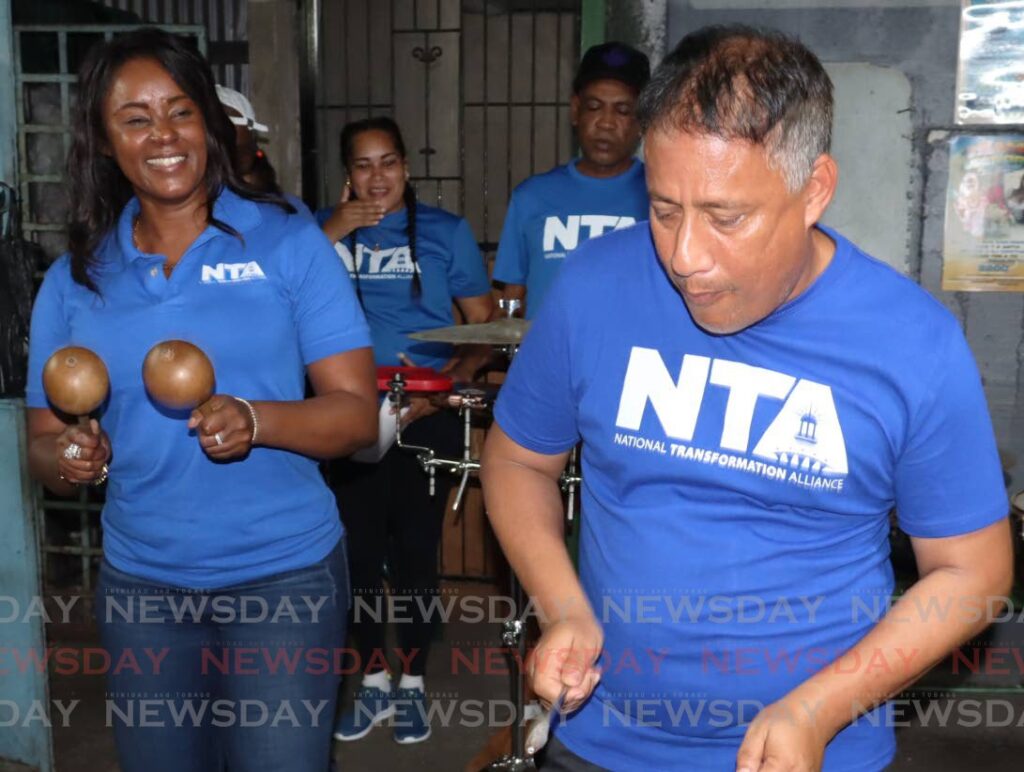NTA leader's wife claims: 'Gary's phone and mine are being tapped'

NICOLE Dyer-Griffith has claimed that cellphones belonging to herself and her husband – National Transformation Alliance (NTA) political leader Gary Griffith – are being tapped.
Addressing an NTA rally in Diamond Vale on Wednesday night, she said "a serious matter" had transpired a few days ago.
"A whistle-blower brought to Gary's and my attention that politicians were instructing law enforcement officials to target political opponents utilising technology that was acquired to deal with criminal activity and target criminals.
"One of these involves wire-tapping or interception of telephone devices."
She said under the Interception of Communications Act, wire-tapping can only be done with proper authorisation. "It cannot be done on a whim and fancy, and there must be a reason. There must be justifiable cause. There must be intelligence or evidence to trigger such an interception."
She said Griffith as NTA leader is now a major political opponent of Government, following a well-known history between the two.
"The information from this whistle-blower is that it appears that instructions were given to have the devices of Gary Griffith, a previous national security minister and commissioner of police, intercepted. There is absolutely no intelligence or evidence to justify this action.
"Hence it being an abuse of national security resources to target political opponents."
She said it also seemed that at some point in time in the past, her phone too, had been tapped.
"This is a serious matter, as it means anyone seen as a political opponent of this Government can have their communications or their personal devices intercepted."
She said her attorneys have written to the police to ask if they had ever wire-tapped her phone but so far, there has been no response.
"Did you intercept my telephone devices? Were you aware of interception taking place, yes or no? It's a simple answer." She wondered why the police had not yet responded to the queries.
Talking later to Newsday about a recent High Court ruling which she brought against the Attorney General and former Acting Police Commissioner McDonald Jacob, Dyer-Griffith wondered whether regular citizens must now become investigators to ascertain hard facts on matters involving the State.
A copy of the judgment, which Newsday has, showed that the High Court on July 31, rejected her claim for breach of privacy via unjustified phone-tapping, on the grounds of a lack of evidence.
In that case, heard before Justice Karen Reid, the Attorney General (who was the first defendant) alleged a lack of evidence to support Dyer-Griffith's claims and what she had brought before the courts was simply hearsay.
The judgment recalled Griffith, at a news conference when he was police commissioner on October 18, claimed to have proof that Dyer-Griffith's phone was tapped.
However, the ruling described his claim – as reported in a newspaper – as being "inadmissible hearsay."
"These proceedings are not like ordinary claims in which pleadings are filed first, setting out facts that are alleged and evidence is filed thereafter to prove those facts, with orders being made during the course of the matter for disclosure et cetera.
"Constitutional proceedings are meant to be dealt with quickly and usually on the basis of cogent affidavit evidence filed in support of and in defence to the claim, which contain no major disputes of fact," the court ruling said. In initiating her claim, the claimant (Dyer-Griffith) must also file her evidence, the judgment said.
"It is absolutely not for the claimant to suggest she can simply file her constitutional claim on the basis of bare allegations of unverifiable hearsay and state that it is for the defendant (the AG) to supply the evidence necessary to prove or disprove her case."
The judgment said Dyer-Griffith had sought to rely on a "general duty of candour" whereby the defendants bore the burden to prove or disprove her case by supplying evidence to determine if her phone was being tapped or not. The judge rejected this idea.
"The claimant cannot invoke the court’s constitutional jurisdiction to say, 'I heard the State might be doing something to breach my rights so let me file a claim and have them come to court to supply evidence proving that they are not'."
The judge said the duty of candour goes both ways.
"Claimant has made no effort to explain why her husband has not filed or could not file an affidavit in support of her claim, annexing the 'proof' to which the newspaper report purports to refer and on which the claimant wishes to rely."

Comments
"NTA leader’s wife claims: ‘Gary’s phone and mine are being tapped’"